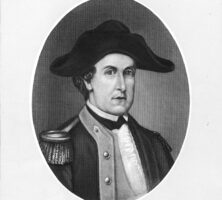Among the few heroes of the Revolutionary War from Georgia, Elijah Clarke (sometimes spelled “Clark”) was born in 1742, the son of John Clarke of Anson County, North Carolina. He married Hannah Harrington around 1763. As an impoverished, illiterate frontiersman, he appeared in the ceded lands, on what was then the northwestern frontier of Georgia, in 1773.

Courtesy of Hargrett Rare Book and Manuscript Library, University of Georgia Libraries.
Clarke’s name appears on a petition in support of the king’s government in 1774. However, he subsequently joined the rebels and, as a militia captain, received a wound fighting the Cherokees in 1776. The following year, he commanded militia against Creek raiders. As a lieutenant colonel in the state minutemen, Clarke received another wound at the Battle of Alligator Bridge, Florida. Then on February 14, 1779, as a lieutenant colonel of militia, Clarke led a charge in the rebel victory at Kettle Creek, Georgia.
All of Georgia and most of South Carolina fell to the British in 1780. Elijah Clarke and thirty men passed through the Native American lands to continue the fight in the Carolinas. As a partisan, Clarke led frontier guerrillas in inflicting a heavy toll against the British and American Loyalists at Musgrove’s Mill, Cedar Springs, Wofford’s Iron Works, Augusta, Fishdam Ford, Long Cane, and Blackstocks. Although he was not present at the battles at King’s Mountain and Cowpens, his campaigns were partially responsible for both of those major patriot victories. Besides receiving several battle wounds, Clarke also survived smallpox and the mumps during the Revolution. The state of Georgia rewarded his services with a plantation. He also obtained thousands of acres of land grants, some by questionable methods, and participated in the notorious Yazoo land fraud of the 1790s.
After the war Clarke served in the state assembly from 1781 to 1790, on the commission of confiscated estates, and in the state constitutional convention of 1789. He also acted as a commissioner for Georgia’s treaties with Native American groups. As a general of militia, he led his men in defeating the Creeks at Jack’s Creek, in present-day Walton County, on September 21, 1787. However, Clarke grew impatient with the failures of the national and state government to bring peace to the frontier and took matters into his own hands. He tried to form an independent republic, known today as the Trans-Oconee Republic, by seizing Creek lands on the Oconee frontier. At least twice, he became involved in plots to invade neighboring Spanish East Florida.
Disenchanted with a settled Georgia, discredited, and almost bankrupt, Elijah Clarke died in Augusta on December 5, 1799. Clarke County, on the former Oconee frontier, is named for him. Several of his descendants have been prominent in politics, including his son John Clark, governor of Georgia from 1819 to 1823.






